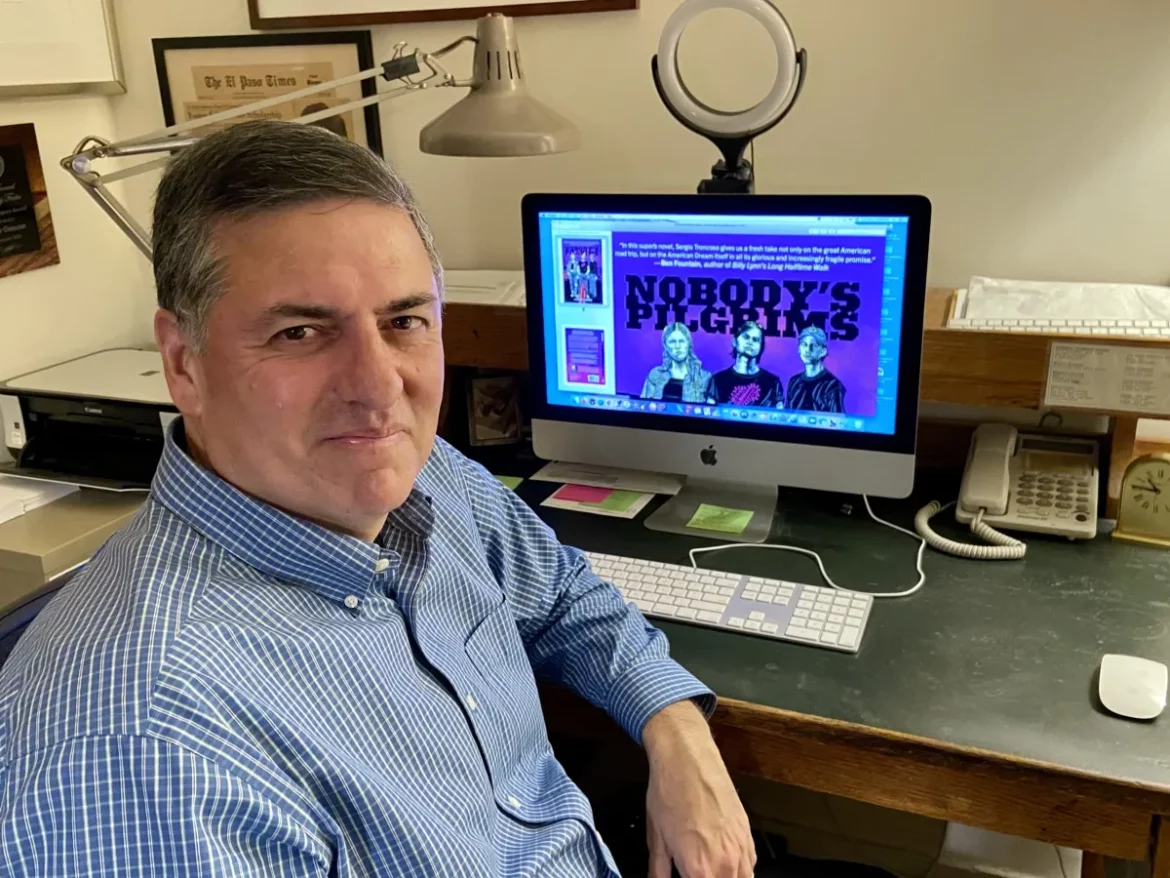Some of the state’s literary giants will be in El Paso this week to attend the Texas Institute of Letters four-day conference, held annually in a different Texas city.
Among the writers scheduled to attend are Carmen Tafolla, who has written more than 30 books and was named the Poet Laureate of Texas in 2015; Skip Hollandsworth, an executive editor and writer for Texas Monthly; and El Paso authors Benjamin Alire Sáenz and Sergio Troncoso.
Troncoso is the outgoing president of the Texas Institute of Letters, a nonprofit honor society founded in 1936 to celebrate Texas literature and recognize distinctive literary achievement.
The group’s festivities begin Wednesday with several readings by TIL members at local libraries.
A native El Pasoan and graduate of Ysleta High School, Troncoso spoke with El Paso Matters ahead of the conference. This email interview has been lightly edited for length and clarity.
El Paso Matters: What is the Texas Institute of Letters, who are its members and what is its primary mission?
Troncoso: The TIL’s elected membership consists of the state’s most respected writers– including winners of the Pulitzer Prize, National Book Award, PEN/Faulkner Award, Man Booker Prize, Academy Award, International Latino Book Award, Americas Award, Lambda Literary Award, MacArthur Fellowship and Guggenheim Fellowship. There are about 200 active TIL members, and they come from every part of the state and live in Texas and outside of Texas. A writer must be nominated by two TIL members and voted on by the TIL Council and general membership before they are inducted into the TIL.
El Paso Matters: As your tenure as TIL president ends this weekend, what will you reflect on when asked to summarize your tenure?
Troncoso: I made it a point to represent all of Texas. That was our greatest accomplishment, from the judges I chose, to the winners and finalists they selected, from the new members inducted into the TIL, to the lifetime achievement award-winners during my tenure, Benjamin Alire Sáenz and Celeste Bedford Walker. With the enthusiastic support of the TIL Council, we focused on finding the best writers who were women, Mexican American, African American, Asian American, or not. I wanted to keep morphing the organization beyond the earlier focus on mostly white men from Austin or Dallas, which lasted too long in my opinion. The TIL now is a different organization than it was, and I’m glad I was part of that change. The best writers in Texas come from every community, from every race and ethnicity, from small towns outside the biggest cities, from El Paso, McAllen and Corpus Christi, among other places.
El Paso Matters: The author presentations begin Wednesday; what is the goal behind them?
Troncoso: The author presentations are free readings/discussions by TIL members in different branches of the El Paso Public Library. El Pasoans can enjoy writers such as Diana Lopez, Steve Davis, W.K. Stratton, Carmen Tafolla, Carol Flake Chapman, Shelley Armitage, and others. These are first-class writers, all of them, and we wanted those who love literature and books in El Paso to have access to these writers. Last year I asked Norma Martinez, the director of the El Paso Public Library, to be one of our judges for the TIL’s children’s book awards, and that began our collaboration to bring these stellar writers to the El Paso community. We want to promote reading, literature and creative writing, and we want to support the El Paso Public Library system. As a child growing up in Ysleta, I became a serious reader at the El Paso Public Library. I became a writer because I had a place to go to read and talk about books — the local public library.
El Paso Matters: One of the presentations is at the Sergio Troncoso Branch Library. For those who aren’t as familiar with you, can you tell us a little bit about yourself and the naming of the library after you?
Troncoso: I am the author of eight books, and I proudly grew up in Ysleta. I graduated from the best high school in El Paso, Ysleta High. I also graduated from Harvard College and received two graduate degrees in international relations and philosophy from Yale University. I teach at the Yale Writers’ Workshop. My short stories, essays and novels often feature Ysleta, or El Paso. It’s the place where my heart always is.
I was a poor kid growing up in Ysleta, and the El Paso Public Library was the place where I found my sanctuary. I found the peace and quiet to concentrate my mind, and I could go and pick up books for free and read to my heart’s content. The public library was so central to my early education and to expanding what I learned in grade school and high school. I had written about my love of the public library in “Crossing Borders: Personal Essays,” for example. And of course, over the years I had often come back to El Paso to visit schools and to give readings and lead discussions about literacy, the importance of reading, and my love of libraries.
In late July 2014, I received a phone call out of the blue from Eddie Holguin, who was the City Council representative of District 6. He said to get myself to El Paso in three days, because something important was about to happen. At a meeting, the El Paso City Council voted unanimously to rename the branch library in Ysleta as the Sergio Troncoso Branch Library. It was one of the proudest moments of my literary life. I had grown up within walking distance from the library. Our family had begun with an outhouse in the backyard and kerosene lamps and stoves in Ysleta. We were as poor as poor can be. But reading, focus, discipline and the Mexican immigrant values of my parents propelled me forward over many years. And I never stopped working to be a literary voice for los de abajo, the underdogs, from Ysleta and El Paso.

El Paso Matters: Some of your books and writings deal with immigrants, Hispanic culture and growing up in a binational region. What is the key to keeping non-Hispanic readers interested in these topics?
Troncoso: That’s really an excellent question, because it’s not just writing books about immigrants or Mexican Americans, but it’s also about those who are not immigrants or Mexican Americans to give these books a chance, to pick them up, and to read them. I come back to this: you will learn something about survival and grit by reading about my abuelita, for example. What I mean is that writers often write about their communities, but that’s not enough. They also have to do their best to show why their writing should matter to everyone, why writing about immigrants should matter to non-immigrants and why not coming together as a community or country will weaken everyone. The primary burden, as you know, still resides in readers who are not Mexican American or immigrants. They must open up their minds; they must give these books a chance; they must be empathetic toward those who may be very different from them. But you can’t force empathy on someone. As a Mexican American writer, I teach people about Ysleta, I engage with their questions and even their mistaken assumptions about the border, I have arguments and debates, and I have created friendships in many different communities. All of this work, I hope, will help spread empathy toward Mexican Americans and immigrants. But it’s a never ending task.
El Paso Matters: As an author, you more than most people, understand the value of books and the written word. What do you make of the current national debate regarding the censorship of books at school libraries?
Troncoso: It’s a disgrace that some exploit social divisions or the fears of “the other” to further divide us. The best reading teaches us about a new perspective and might even make us uncomfortable. That’s the point of an education, to open up your mind, to challenge your assumptions, to unmoor you. And frankly, what is in our school libraries should reflect the diversity and complexity of every community, and not just the books that mirror who you are and what you are comfortable with. But we have created too many bubbles that just reflect our prejudices, rather than make us question whether our assumptions are wrong, or should be reconsidered. Many people have created what I call “bubble-prisons,” in which they don’t even know that they are the inmates.
El Paso Matters: What is next for Sergio Troncoso?
Troncoso: I have a new novel, “Nobody’s Pilgrims,” forthcoming on May 10. Three teenagers, Turi, Arnulfo and Molly, are on the run from evil and unwittingly carrying even a greater menace in their stolen truck. The border goes beyond the border in a cross-country adventure story about who belongs in the United States and how finding your place in a dystopian America is most importantly about finding the right person to be with you. I’ll be doing a lot of events in El Paso, and readers can always find my schedule of appearances on my website. Please come by and say hello.
This article first appeared on El Paso Matters and is republished here under a Creative Commons license.


